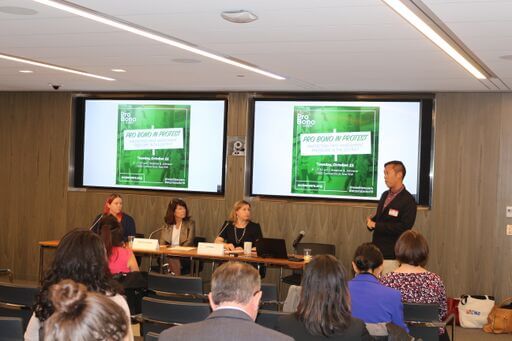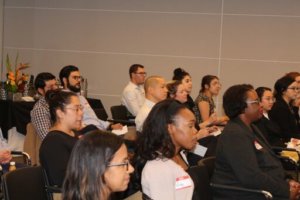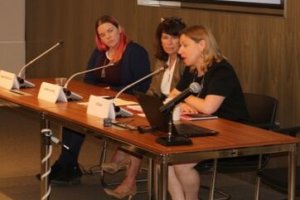
Pro Bono in Protest: Protecting First Amendment Freedoms in the District
D.C. hosts over 2,000 protests a year. This unique landscape gives local lawyers an amazing chance to protect democracy and uphold the First Amendment.
To highlight and promote pro bono opportunities in this exciting area, the Washington Council of Lawyers hosted Pro Bono in Protest: Protecting First Amendment Freedoms in the District on October 22, 2019 at Steptoe & Johnson, with co-sponsorship from the American Constitution Society, the Filipino American Lawyers Association of Washington, DC, and the Metropolitan Washington Employment Lawyers Association. The panelists, representing a diversity of practice areas, included moderator Jill Dash, Vice President of Strategic Engagement at the American Constitution Society; Maggie Ellinger-Locke, Staff Attorney at Greenpeace USA; and Barbara Harding, Partner at Jones Day. All of these panelists do significant pro bono work – Dash as President of the Women’s Bar Association of D.C.; Ellinger-Locke with the National Lawyers Guild (NLG) in St. Louis and D.C., the Movement for Black Lives D.C., Law4BlackLives D.C., and other local racial justice initiatives; and Harding with the Lawyers’ Committee for Civil Rights Under Law and many other organizations.


For lawyers who want to stand up in court on behalf of protesters, there is no shortage of opportunities. The most critical time for legal support is after the protest ends when the immediate support network has dispersed, but when protesters are left behind facing criminal charges. D.C.-area lawyers wanting to do this representation benefit from what Harding called a “rich defense tradition in our country of representing everyone,” and a robust local network of colleagues and potential mentors taking on these cases. Ellinger-Locke noted that most arrested protesters face charges for civil ordinance violations or misdemeanors, not felonies, which makes their cases simpler to handle pro bono.
There also many options to assist protesters outside the courtroom. For attorneys who want to be out on the streets themselves, standing beside protesters in support, a notable opportunity facilitated by Ellinger-Locke and others is the Legal Observer (LO) Program of the NLG. As Harding said, the LO program is “a representation of why many of us got into law” – using our legal training to ensure “that laws are just and are justly enforced.” Benefiting from NLG’s long-running training and support program, LOs (who themselves do not protest in this role but who support a protesting organization) monitor and record police misconduct at the scene, gather evidence for later criminal and civil trials, interface with the media, and help arrested protesters starting with the arrest and bail hearings. Ellinger-Locke reported that when she is in an LO role, many people come up to her to say, “Thank you so much for being here. You make me feel safe.”
Lawyers participating in roles like these can learn movement lawyering, an approach that Ellinger-Locke described as “thinking like an organizer first and a lawyer second.” Through this work, lawyers can improve their effectiveness as advocates for a variety of clients and other movement participants. While demanding – Ellinger-Locke recalled her time in the Ferguson protests as “being tear-gassed at night and representing people in the morning”– this work is rewarding. Ellinger-Locke quoted an experienced movement lawyer saying, “You know you’re doing your job well when the clients invite you into their homes,” and shared her own stories of reaching this level of trust in her relationships with protesters.
For attorneys who want to proactively support peaceful protests – before they even begin – Harding encouraged involvement with the Lawyers’ Committee’s Know Your Rights Initiative, in which she has long worked to train protesters as to their legal rights and responsibilities (see the D.C. brochure), educate law enforcement as to its legal responsibilities, and facilitate communication between protesters and law enforcement to manage conflicts and diffuse violence on the scene. (While protesters will hold different views toward cooperating with law enforcement, everyone on the panel did agree that D.C. law enforcement agencies are accustomed to protests, such that doing this work here may often be less strenuous than elsewhere.)
Beyond the opportunities above, attorneys can provide transactional services to nonprofit organizations engaging in protest or policy reform of potentially unconstitutional laws and ordinances restricting the right to protest. The panelists encouraged interested attendees to simply call up their favorite nonprofits and ask if they need pro bono representation – which they often will!
Attorneys in all practice areas can and should get involved in protest pro bono. For attorneys in private practice in particular, who might be concerned about controversial protests, Harding still urged them to look into the options. In many firms, representing protesters will ordinarily pose no barriers other than the usual conflict checks. Harding explained that many D.C. lawyers have represented controversial defendants and that the legal community understands the broader principles at stake.
As Harding concluded: “People are out in the streets. There are so many things to protest!” And as Washington Council of Lawyers Board Member Paul S. Lee reminded attendees: “It is our responsibility as lawyers to stick up for people putting themselves on the line.”






